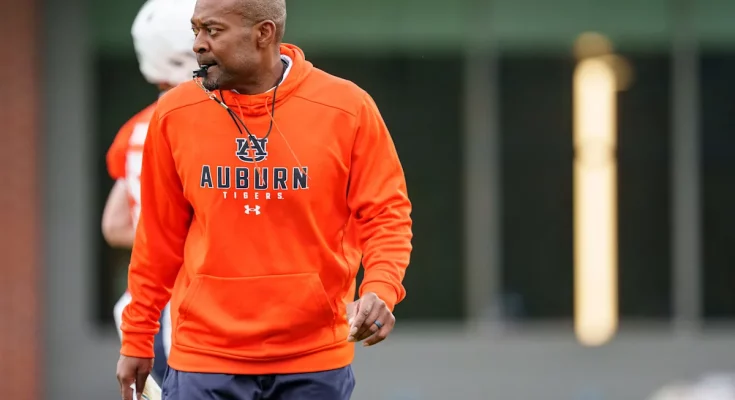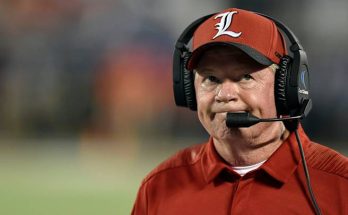Derrick Nix Finally Breaks Silence on Auburn’s Struggling Offense—What He Said Will Stun Fans
Auburn’s offense has been under a microscope since the first snap of the season. With high expectations, new faces, and a fresh coaching staff, many believed that this would be the year the Tigers’ offense finally clicked. Instead, fans have watched a rollercoaster ride of inconsistent drives, stalled possessions, and flashes of potential that seem to fizzle out before they can become anything sustainable. Amid the criticism and confusion, Auburn assistant coach and offensive coordinator Derrick Nix has finally spoken up—and what he’s saying is turning heads throughout the college football world.
Derrick Nix isn’t one to sugarcoat things. He doesn’t dress up bad performances in coach speak or spin statistics into something they’re not. And that’s exactly what Auburn fans needed to hear. In his recent media appearances, Nix acknowledged the obvious: the offense is struggling. But rather than point fingers or dodge responsibility, he laid out exactly what the issues are—and what needs to change. According to Nix, it’s not just one thing. It’s not just the quarterback. It’s not just the play calling. It’s everything. From fundamentals to focus, execution to effort, Nix painted a clear picture of an offense still trying to find itself.
He made it clear that the team is showing “flashes,” but not enough consistency to compete at the level expected at Auburn. He’s seen the big plays. He’s seen the potential. But in between those moments are too many breakdowns. Mistakes in blocking assignments. Missed reads. Poor route timing. Turnovers at the worst possible moments. And all of that, Nix says, comes down to the details—details that Auburn simply hasn’t mastered yet. He talked about route depth, proper hat placement, and quarterback timing as examples of the small things that become big problems when left unchecked.
But what really stood out in Nix’s comments was his focus on effort. Not just running hard or finishing blocks, but something deeper—playing every snap with intent, discipline, and urgency. He challenged his players to bring what he called “fanatical effort” every single play. In a league as competitive and brutal as the SEC, half-speed or half-focus simply won’t cut it. And according to Nix, that kind of high-effort mindset isn’t just a bonus—it’s a requirement if Auburn wants to compete with the best.
He didn’t shy away from discussing the mental side of the game, either. Nix talked about the need for confidence, clarity, and belief in the system. He admitted that the offense is still a work in progress—not because of talent shortages, but because the players haven’t yet fully bought into the system. There’s hesitation. There’s uncertainty. And when that seeps into an offense, especially in the fast-paced, high-pressure world of SEC football, it becomes hard to generate rhythm. Nix knows that. And he’s working to fix it.
What’s also become clear is that Nix believes in explosive plays—but only if they come from the right foundation. He doesn’t want fluke touchdowns or backyard football. He wants big plays that come from perfect execution—reads made on time, blocks sealed correctly, passes delivered with precision, and receivers making the right cuts. For Nix, explosive plays are a product of doing the small things right, not gambling on broken coverage or hero-ball antics. That’s a mindset that speaks volumes about the kind of offense he’s trying to build: disciplined, calculated, but still dangerous.
It’s also worth noting that Nix has been careful not to single out players. He hasn’t thrown the quarterback under the bus. He hasn’t called out individual linemen. Instead, he’s spoken about the offense as a collective group, one that has to rise together or fall apart together. That kind of leadership matters, especially for a unit that is clearly under pressure. He’s trying to build trust, not tear it down. And in the long run, that might be the key to Auburn finding its offensive identity.
Nix also emphasized accountability. He’s not exempting himself or the coaching staff from blame. In fact, he’s been upfront in saying that the offensive struggles are just as much on the coaches as they are on the players. If things aren’t clicking, it’s because the message isn’t landing. If assignments are missed, it’s because they haven’t been taught clearly enough. That level of honesty is rare in the world of college football, but it’s exactly what Auburn needed. Transparency creates urgency, and urgency can spark change.
While the road ahead won’t be easy, Nix remains optimistic. He believes the talent is there. He believes the playbook works. And most importantly, he believes that the players are close to turning the corner. But “close” doesn’t get it done in the SEC. Close won’t beat Georgia. Close won’t score 30 points on LSU. The gap between potential and performance has to close—fast. And that’s why Nix’s message is as much about mentality as it is about Xs and Os.
For Auburn fans, Nix’s comments offer a mix of frustration and hope. On one hand, it’s painful to hear that the issues are as deep as they appear. But on the other hand, it’s refreshing to know that the staff sees it too—and isn’t pretending otherwise. The problems are real, but so is the plan to fix them. Whether that plan can translate into wins remains to be seen, but at least the team is being led by someone who understands what’s broken and isn’t afraid to call it out.
The next few weeks will be critical for Auburn. If the offense can tighten up, cut down on the errors, and start executing with consistency, the season can still be salvaged. There are still big games ahead. There are still chances to make noise. But it all starts with the little things—the footwork, the reads, the mindset. Derrick Nix knows that. Now it’s up to his players to prove that they do too.
If there’s one takeaway from everything Nix has said, it’s this: the offense isn’t hopeless. It’s just unfinished. And in college football, especially in the SEC, sometimes the difference between falling apart and turning a season around is simply belief—belief in the system, belief in your teammates, and belief that execution will bring results. Derrick Nix still believes. The question now is—will the rest of the team follow his lead before it’s too late?



